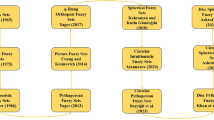Abstract
As a typical multiple criteria comprehensive evaluation (MCCE) problem, healthcare insurance audits (HIA) play a vital role in governmental audits. To handle the HIA in an autonomous region in China, a systematic methodology in the framework of MCCE is presented. An evaluation system is constructed at first based on the specific auditing objective. The group of individual preferences is collected by a probabilistic linguistic preference relation (PLPR). Its consistency and prioritization are handled based on the idea of stochastic analysis and the widely acknowledged techniques of linguistic preference relations (LPRs). Specifically, the consistency degree is measured by the probability of stochastically generated LPRs being with acceptable consistency, and then improved by revising the probabilistic distributions involved in the PLPR. The priority is derived by the expected value of priorities of the stochastically generated LPRs. Moreover, the comprehensive evaluation is conducted based on aspiration-based utility functions. The proposed methodology enables decision makers to determine parameters intuitively, and presents interpretable and admissible results. It is effective even if the original individual preferences are with low consistency degree. Finally, the focused HIA problem is solved based on the proposed methodology.



Similar content being viewed by others
References
Cabrerizo, F.J., Alonso, S., Herrera-Viedma, E.: A consensus model for group decision making problems with unbalanced fuzzy linguistic information. Int. J. Inf. Technol. Decis. Mak. 8(01), 109–131 (2009)
Feng, B., Lai, F.J.: Multi-attribute group decision making with aspirations: a case study. Omega 44, 136–147 (2014)
Fu, H.H., Lin, D.K., Tsai, H.T., Wei, D.: Applying lot-by-lot double sampling plan to reform Taiwan national health insurance auditing system. Qual. Quant. 43(4), 571–584 (2009)
Fu, H.H., Tsai, H.T., Lin, C.W., Wei, D.: Application of a single sampling plan for auditing medical-claim payments made by Taiwan national health insurance. Health Policy 70(2), 185–195 (2004)
Gao, J., Xu, Z.S., Ren, P.J., Liao, H.C.: An emergency decision making method based on the multiplicative consistency of probabilistic linguistic preference relations. Int. J. Mach. Learn. Cybern. 10(7), 1613–1629 (2019)
He, J.H.: Reorganization of anti-corruption agencies in China. J. Money Laund. Control 19(2), 106–108 (2016)
Lahdelma, R., Salminen, P.: SMAA-2: stochastic multicriteria acceptability analysis for group decision making. Oper. Res. 49(3), 444–454 (2001)
Li, C.C., Dong, Y.C., Xu, Y.J., Chiclana, F., Herrera-Viedma, E., Herrera, F.: An overview on managing additive consistency of reciprocal preference relations for consistency-driven decision making and fusion: taxonomy and future directions. Inf. Fusion 52, 143–156 (2019)
Liao, H.C., Mi, X.M., Xu, Z.S.: A survey of decision-making methods with probabilistic linguistic information: bibliometrics, preliminaries, methodologies, applications and future directions. Fuzzy Optim. Decis. Mak. 19(1), 81–134 (2020)
Liu, G., Gong, K.: State Auditing and Anticorruption Campaign: Evidence from China, pp. 117–139. Springer Singapore, Singapore (2018)
Luo, S.Z., Zhang, H.Y., Wang, J.Q., Li, L.: Group decision-making approach for evaluating the sustainability of constructed wetlands with probabilistic linguistic preference relations. J. Oper. Res. Soc. 70(12), 2039–2055 (2019)
Macharis, C., Milan, L., Verlinde, S.: A stakeholder-based multicriteria evaluation framework for city distribution. Res. Transp. Bus. Manag. 11, 75–84 (2014)
Martinez-Alier, J., Munda, G., O’Neill, J.: Weak comparability of values as a foundation for ecological economics. Ecol. Econ. 26(3), 277–286 (1998)
Munda, G.: Social multi-criteria evaluation: methodological foundations and operational consequences. Eur. J. Oper. Res. 158(3), 662–677 (2004)
Orlovsky, S.: Decision-making with a fuzzy preference relation. Fuzzy Sets Syst. 1(3), 155–167 (1978)
Paim, CdRP, Zucchi, P.: Evaluation auditing of the quality of health care in accreditation of health facilities. Ciencia & Saude Coletiva 16, 1163–1171 (2011)
Pang, Q., Wang, H., Xu, Z.S.: Probabilistic linguistic term sets in multi-attribute group decision making. Inf. Sci. 369, 128–143 (2016)
Rosen, R.: Complexity as a system property\(\dagger\). Int. J. Gen. Syst. 3(4), 227–232 (1977)
Saaty, T.L.: A scaling method for priorities in hierarchical structures. J. Math. Psychol. 15(3), 234–281 (1977)
Saaty, T.L.: Axiomatic foundation of the analytic hierarchy process. Manag. Sci. 32(7), 841–855 (1986)
Saaty, T.L.: How to make a decision: the analytic hierarchy process. J. Oper. Res. Soc. 48(1), 9–26 (1990)
Saaty, T.L.: A ratio scale metric and the compatibility of ratio scales: the possibility of arrow’s impossibility theorem. Appl. Math. Lett. 7(6), 45–49 (1994)
Schneider, T., Sommerfeld, W., Möller, J.: Audits across state borders for medical consulting agencies within the german healthcare insurance system. Gesundheitswesen 65(6), 365–370 (2003)
Shaikh, M., Woodward, M., Rahimi, K., Patel, A., Rath, S., MacMahon, S., Jha, V.: Use of major surgery in south india: a retrospective audit of hospital claim data from a large, community health insurance program. Surgery 157(5), 865–873 (2015)
Simon, H.A.: Rational choice and the structure of the environment. Psychol. Rev. 63(2), 129–138 (1956)
Sinha, P.C., Ghosh, S.K.: Determination of sample size for auditing medical insurance claims. J. Commer. Account. Res. 1(4), 24–32 (2012)
Song, Y.M.: Deriving the priority weights from probabilistic linguistic preference relation with unknown probabilities. PLoS ONE 13(12), e0208855 (2018)
Tervonen, T., Lahdelma, R.: Implementing stochastic multicriteria acceptability analysis. Eur. J. Oper. Res. 178(2), 500–513 (2007)
Ureña, R., Chiclana, F., Morente-Molinera, J., Herrera-Viedma, E.: Managing incomplete preference relations in decision making: a review and future trends. Inf. Sci. 302, 14–32 (2015)
Vetter, S., Studier-Fischer, S., Wentzensen, A., Frank, C.: The challenge of auditing by medical health insurance inspectors: development of individual case inspections according to 275ff SGB V. Der Unfallchirurg 112(8), 756–758 (2009)
Wang, H.: Extended hesitant fuzzy linguistic term sets and their aggregation in group decision making. Int. J. Comput. Intell. Syst. 8(1), 14–33 (2015)
Wang, H., Xu, C., Xu, Z.S.: An approach to evaluate the methods of determining experts’ objective weights based on evolutionary game theory. Knowl.-Based Syst. 182, 104862 (2019)
Wang, H., Xu, Z.S., Zeng, X.J.: Modeling complex linguistic expressions in qualitative decision making: an overview. Knowl.-Based Syst. 144, 174–187 (2018)
Wu, X.L., Liao, H.C., Xu, Z.S., Hafezalkotob, A., Herrera, F.: Probabilistic linguistic MULTIMOORA: a multicriteria decision making method based on the probabilistic linguistic expectation function and the improved Borda rule. IEEE Trans. Fuzzy Syst. 26(6), 3688–3702 (2018)
Wu, Z.B., Xu, J.P.: A consistency and consensus based decision support model for group decision making with multiplicative preference relations. Decis. Support Syst. 52(3), 757–767 (2012)
Xu, Z.S.: Deviation measures of linguistic preference relations in group decision making. Omega 33(3), 249–254 (2005)
Xu, Z.S., Wang, H.: On the syntax and semantics of virtual linguistic terms for information fusion in decision making. Inf. Fusion 34, 43–48 (2017)
Yan, H.B., Ma, T., Sriboonchitta, S., Huynh, V.N.: A stochastic dominance based approach to consumer-oriented kansei evaluation with multiple priorities. Ann. Oper. Res. 256, 329–357 (2017)
Zadeh, L.A.: The concept of a linguistic variable and its application to approximate reasoning-I. Inf. Sci. 8(3), 199–249 (1975)
Zhang, Y.X., Xu, Z.S., Wang, H., Liao, H.C.: Consistency-based risk assessment with probabilistic linguistic preference relation. Appl. Soft Comput. 49, 817–833 (2016)
Zhu, B., Xu, Z.S., Zhang, R., Hong, M.: Generalized analytic network process. Eur. J. Oper. Res. 244(1), 277–288 (2015)
Acknowledgements
This work was supported in part by the National Natural Science Foundation of China (Nos. 71971119, 71972102), the social science foundation of Jiangsu Province (No. 19GLC009), the Key University Science Research Project of Jiangsu Province (No. 18KJB413006), and the 2018 Youth Teacher Research Project of Nanjing Audit University.
Author information
Authors and Affiliations
Corresponding author
Rights and permissions
About this article
Cite this article
Xu, C., Qian, G. & Wang, H. Stochastic Multiple Criteria Comprehensive Evaluation Based on Probabilistic Linguistic Preference Relations: A Case Study of Healthcare Insurance Audits in China. Int. J. Fuzzy Syst. 22, 1607–1623 (2020). https://doi.org/10.1007/s40815-020-00865-2
Received:
Revised:
Accepted:
Published:
Issue Date:
DOI: https://doi.org/10.1007/s40815-020-00865-2




